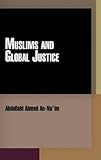Muslims and Global Justice / Abdullahi Ahmed An-Na'im.
Material type: TextSeries: Pennsylvania Studies in Human RightsPublisher: Philadelphia : University of Pennsylvania Press, [2011]Copyright date: ©2011Description: 1 online resource (384 p.)Content type:
TextSeries: Pennsylvania Studies in Human RightsPublisher: Philadelphia : University of Pennsylvania Press, [2011]Copyright date: ©2011Description: 1 online resource (384 p.)Content type: - 9780812242867
- 9780812204339
- Civil rights (Islamic law)
- Globalization -- Religious aspects -- Islam
- Globalization -- Religious aspects -- Islam
- Human rights -- Religious aspects -- Islam
- Human rights -- Religious aspects -- Islam
- Law and globalization
- SOCIAL SCIENCE -- Islamic Studies
- Human Rights
- SOCIAL SCIENCE / Islamic Studies
- Human Rights
- Law
- Religion
- Religious Studies
- 340.5/9 22
- KBP2460 .N353 2011
- online - DeGruyter
- Issued also in print.
| Item type | Current library | Call number | URL | Status | Notes | Barcode | |
|---|---|---|---|---|---|---|---|
 eBook
eBook
|
Biblioteca "Angelicum" Pont. Univ. S.Tommaso d'Aquino Nuvola online | online - DeGruyter (Browse shelf(Opens below)) | Online access | Not for loan (Accesso limitato) | Accesso per gli utenti autorizzati / Access for authorized users | (dgr)9780812204339 |
Frontmatter -- Contents -- Introduction. Reimagining Global Justice -- Part I. The Challenge of Universality and Cultural/Religious Legitimacy -- Chapter 1. Islamic Ambivalence to Political Violence: Islamic Law and International Terrorism -- Chapter 2. Problems of Universal Cultural Legitimacy for Human Rights -- Chapter 3. Toward a Cross-Cultural Approach to Defining International Standards of Human Rights: The Meaning of Cruel, Inhuman, or Degrading Treatment or Punishment -- Part II. Prospects of Mediation for the Paradox of Universality and State Self-Regulation -- Chapter 4. State Responsibility Under International Human Rights Law to Change Religious and Customary Laws -- Chapter 5. Islamic Foundations of Religious Human Rights -- Chapter 6. Cultural Transformation and Normative Consensus on the Best Interest of the Child -- Chapter 7. Toward an Islamic Hermeneutics for Human Rights -- Part III. Regional and Global Perspectives -- Chapter 8. Competing Claims to Religious Freedom and Communal Self-Determination in Africa -- Chapter 9. Globalization and Jurisprudence: An Islamic Perspective -- Chapter 10. The Politics of Religion and the Morality of Globalization -- Chapter 11. Global Citizenship and Human Rights: From Muslims in Europe to European Muslims -- Notes -- Bibliography -- Index -- Acknowledgments
restricted access online access with authorization star
http://purl.org/coar/access_right/c_16ec
Over the course of his distinguished career, legal scholar Abdullahi Ahmed An-Na'im has sought to reconcile his identity as a Muslim with his commitment to universal human rights. In Muslims and Global Justice, he advances the theme of global justice from an Islamic perspective, critically examining the role that Muslims must play in the development of a pragmatic, rights-based framework for justice.An-Na'im opens this collection of essays with a chapter on Islamic ambivalence toward political violence, showing how Muslims began grappling with this problem long before the 9/11 attacks. Other essays highlight the need to improve the cultural legitimacy of human rights in the Muslim world. As An-Na'im argues, in order for a commitment to human rights to become truly universal, we must learn to accommodate a range of different reasons for belief in those rights. In addition, the author contends, building an effective human rights framework for global justice requires that we move toward a people-centered approach to rights. Such an approach would value foremost empowering local actors as a way of negotiating the paradox of a human rights system that relies on self-regulation by the state.Encompassing over two decades of An-Na'im's work on these critical issues, Muslims and Global Justice provides a valuable theoretical approach to the challenge of realizing global justice in a world of profound religious and cultural difference.
Issued also in print.
Mode of access: Internet via World Wide Web.
In English.
Description based on online resource; title from PDF title page (publisher's Web site, viewed 24. Apr 2022)


